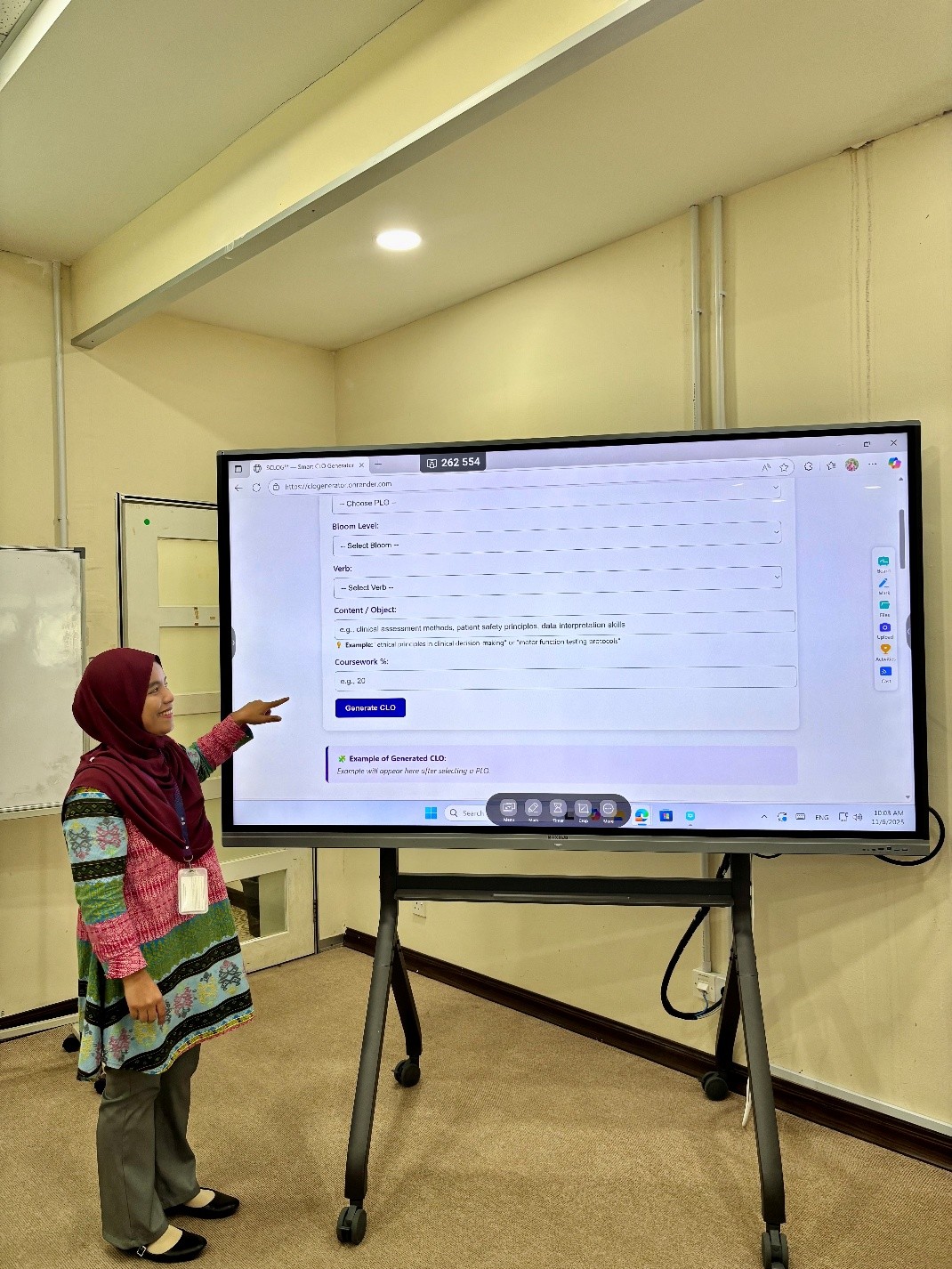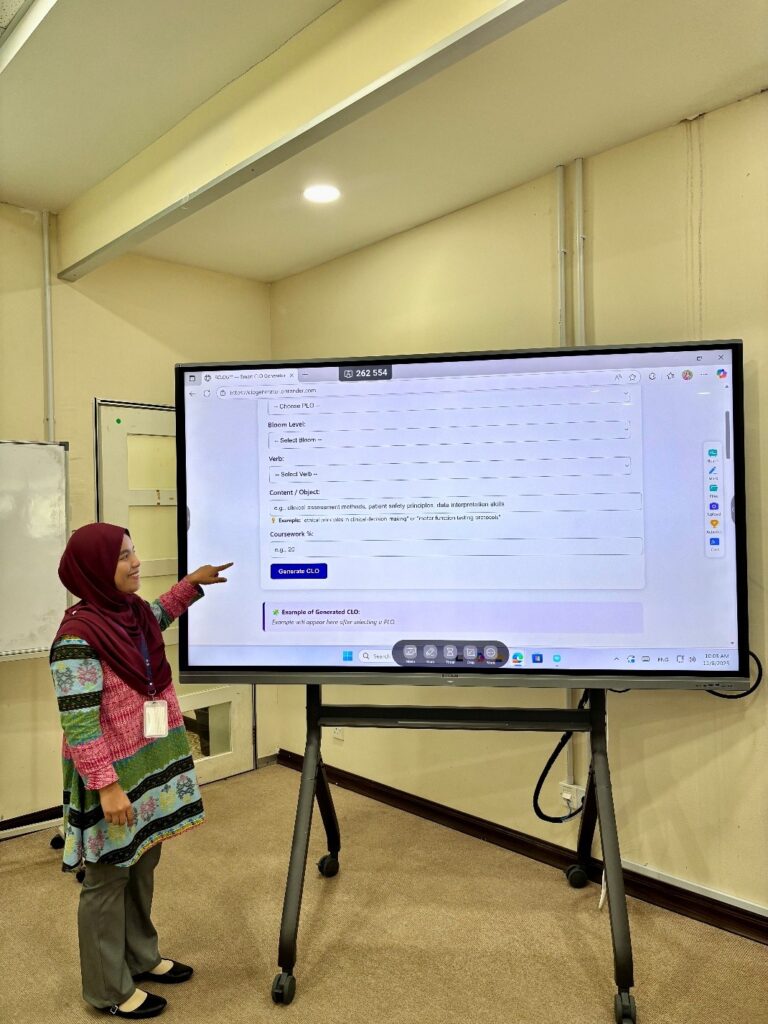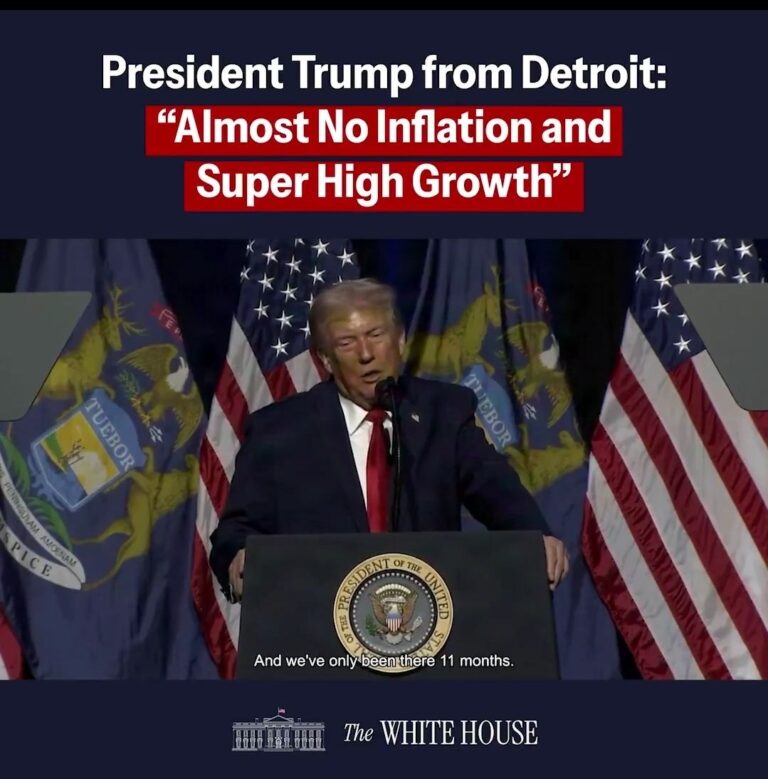
By Hazwani Ahmad Yusof @ Hanafi
Across Malaysian universities, educators today wear many hats. We are teachers, curriculum designers, quality auditors, and digital administrators. Each role demands precision, patience, and purpose. At the centre of all this lies the Course Learning Outcomes (CLOs), statements that must align with Bloom’s Taxonomy, programme objectives, accreditation standards, and now the nation’s commitment to Values-Based Education (VBE) and the Sustainable Development Goals (SDGs).
After years of preparing courses, leading programme reviews, and completing endless accreditation documents, I began to notice a pattern. We spent so much time perfecting these technical requirements that we sometimes lost sight of what truly matters: connecting with our students. That realisation led me to create the Smart CLO Generator (SCLOG), a digital tool built to make life a little easier for educators like us.

A tool born of experience
Lecturers often spend hours ensuring each CLO fits the right taxonomy, reflects institutional standards, and embeds relevant values. The process is intellectually rewarding but also mentally draining. I wanted to design something practical, human-centred, and easy to use; a system that could help us focus less on formatting and more on mentoring.
The Smart CLO Generator is a web-based platform that creates CLO statements with embedded values and sustainability aspects at the click of a button. It structures outcomes according to learning taxonomies and presents them in a clear, colour-coded visual format. The goal was never to replace the educator but to support them, making technology serve people rather than the other way around.
Bridging policy and practice
Malaysia’s Ministry of Higher Education has long emphasised the importance of integrating VBE and Education for Sustainable Development (ESD) into all curricula. Yet turning policy into practice remains a major challenge. SCLOG helps bridge that gap by embedding empathy, ethics, equity, and sustainability directly into every CLO it generates.
In doing so, the tool goes beyond documentation. It becomes a small but meaningful agent of cultural change, one that nurtures a generation of lecturers and students who see education not just as knowledge transfer but as character formation.
Innovation with a human touch
The story of SCLOG is not about automation alone. It is about redefining how we relate to technology in academia. In an age where digital systems often reduce human connection, I wanted SCLOG to do the opposite: to bring back the human spirit in teaching.
When lecturers use the system, they are reminded to reflect not only on what students will learn but also on why it matters and how each outcome contributes to empathy, awareness, and responsibility. This philosophy aligns deeply with USM’s DNA of sustainability, integrity, and innovation.
We often talk about student-centred learning, but we also need educator-supported systems. When lecturers feel empowered, students benefit and so does the institution.
From local innovation to national impact
Since its launch, SCLOG has gained attention beyond USM. Colleagues from other universities have started exploring it to streamline course planning and enhance quality assurance. Its timing could not be better. As higher education institutions move towards aligning with SDG 4 (Quality Education) and SDG 9 (Innovation and Infrastructure), the demand for efficient, transparent, and values-driven tools continues to grow.
SCLOG transforms what used to be hours of manual cross-referencing into a few minutes of guided work, complete with clear mapping visuals for audits and reviews. Tools like this, I believe, will soon become essential in ensuring that our education system remains accountable and forward-looking.
A vision for the next generation
As Malaysia moves toward a values-based, innovation-driven education system, we need more than new policies or digital platforms. We need educators who feel encouraged, supported, and inspired to evolve.
My hope is that SCLOG contributes to that ecosystem, one where empathy and efficiency coexist, and where technology lightens our administrative load so we can teach with joy again. The next step, I believe, is collaboration.
I look forward to partnering with other institutions to expand and refine SCLOG, building a shared digital ecosystem for Malaysian higher education that upholds not just the mind but also the heart.
Assoc. Prof. Dr Hazwani Ahmad Yusof @ Hanafi is an associate professor at the Department of Community Health, Advanced Medical and Dental Institute (IPPT), Universiti Sains Malaysia (USM)

















